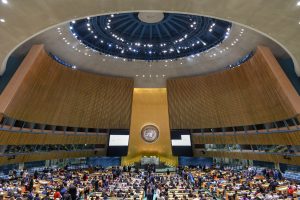Written into the United Nations Charter, which opens with the words, “We the peoples of the United Nations,” are the fundamental principles of human rights, the worth and dignity of each person, equality of all people, and respect for the aspirations of all people.
In 1948, nations pledged themselves to promote respect for human rights and fundamental freedoms in the Universal Declaration of Human Rights. The principles enshrined in these documents are as universal now as they were at the time of their passing. My countrymen yearn to live by the principles adopted by the United Nations. Since July 2018, Ambassador Kyaw Moe Tun has served as Myanmar’s permanent representative to the U.N. and has spoken for the aspirations of the Myanmar people. He courageously continues to represent the Myanmar people’s desires for freedom and human rights, despite threats to his and his family’s safety from Myanmar’s military coup plotters.
Myanmar, then known as Burma, was among the first 48 nations to adopt the Universal Declaration of Human Rights. Those principles are more relevant to my countrymen than at any time in our history.
In February 2021, the Myanmar military staged an attempted coup to overturn the results of the 2020 election. Our country knows military dictatorship. From 1962 to 2011 we lived under a succession of military juntas that sought to legalize and entrench their political role through sham constitutional processes.
We could not speak freely, the only “correct” political views were dictated to the people in state-run media. Access to the internet and information was severely restricted and people could not freely travel. Gatherings of more than five people were banned. However, during a brief democratization period from 2011 to 2021 we started to know what it meant to live in an open society and a vibrant, if incomplete, democracy.
The people have said “NO” to the military’s attempt to turn back the clock. They have rejected military rule and taken to the streets demanding a government that reflects their values, and those of the U.N.: an inclusive federal democracy, human rights, freedom, equality, and the dignity of each person. Their message is simple: the country belongs to the people, not the military.
The people have paid dearly for their courage. The carnage has been horrific. The military has killed over 2,200 civilians, including hundreds of children. They have burned some 30,000 homes. Those returning to destroyed villages find not only the smoking ruins of their homes but also the remains of men and women burned alive because they could not escape. The junta has imprisoned more than 12,500 people for voicing opposition to military rule. Over the protests of countries around the world, including our ASEAN neighbors, the junta hanged four political prisoners.
On September 16, a school located in Let Yet Kone village monastery compound in Sagaing Region came under attack for hours by the Myanmar military – firstly from MI35 attack helicopters, then by infantry. This attack killed and injured scores of innocent school children, some as young as 6. The U.N. Human Rights Council-mandated Independent Investigative Mechanism for Myanmar stated that the Let Yet Kone school attack “could be a war crime – with commanders criminally liable.”
Today, more than 1 million people in Myanmar are internally displaced. An open society and growing prosperity have been replaced with hunger, cash shortages, fuel lines, and capital flight. A civil war between the military and democratic forces rages over most of the country. Yet despite the suffering, the people fight on, determined not to return to military rule. The military junta’s power-grab has not only devastated Myanmar but encouraged tyrants around the world. However, my countrymen are showing the world that people, if united, can defeat tyranny, institutionalize democracy, and deliver justice.
The military’s coup attempt has failed. The junta has been unable to impose its rule throughout the country. The people have come together in extraordinary unity to oppose the military. The National Unity Consultative Council has produced a Federal Democracy Charter, which lays out a roadmap to federal democracy and interim constitutional arrangements.
The people have overwhelmingly supported the National Unity Government (NUG) as a legitimate government comprising lawmakers who won seats in the 2020 election, civil society members, and professionals. The NUG has raised and disbursed millions of dollars to fund schools, hospitals, humanitarian assistance, and the struggle to build a new, fully democratic Myanmar.
The nearly 20 months since the coup attempt have also been a time of reckoning. We have had to face and acknowledge our own shortcomings. In 2017, few of our people raised their voices against the military’s genocide of the Rohingya people. Past military regimes’ narratives about the Rohingya were deeply entrenched in society. The junta still rejects the very name Rohingya, but we have learned. The NUG has committed itself to repatriation and full citizenship for the Rohingya.
Though we cannot say with certainty when we will arrive, we can see our destination: a new country based on freedom, democracy, and rule of law that supports a stable, peaceful society committed to the universal principles of the U.N.
As our late countryman, U.N. Secretary-General U Thant, said: “The worth of the individual human being is the most unique and precious of all our assets and must be the beginning and end of all our efforts.” As the U.N. Credentials Committee meets to discuss who will hold Myanmar’s seat later this year, it is more important than ever for Ambassador Kyaw Moe Tun to continue representing us at the global body. This will reaffirm the international community’s commitment to the U.N. Charter and recognize the aspirations of the Myanmar people.
The Credentials Committee has an opportunity to do the right thing. Let us hope they rise to the occasion and live up to the words and principles that the world agreed to in 1948.

































